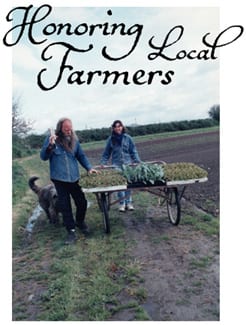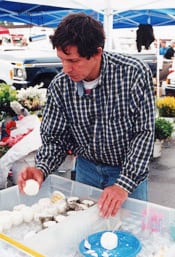Honoring Local Farmers
by Aliica Lundquist Guy
This article was originally published in July 2001

This month, we continue our tribute to the hard-working family farmers of our region. Thanks to them, ingredients for our favorite summer recipes are at the absolute peak of freshness. To sit down at the table and be able to appreciate the real people that put the bounty before us is a great gift, any time of the year
Rent’s Due Ranch
Joane McIntyre appears and disappears in a flash — something like the sunny St. Nicholas of the farming community. In early spring, she leaves in her wake hearty plant starts of everything from arugula to zucchini. She and the rest of the family at Rent’s Due Ranch have been working away in their greenhouse workshop since January, growing thousands of plant starts. In the spring, we ‘ooh’ and ‘ah’ when those surefire signs of the changing season are lined up along dew-dappled carts, beckoning us to take them home to our own gardens.
During the spring season, Joane is on the road making deliveries almost 40 hours a week. Meanwhile, Michael Shriver, her partner in this adventure, is hard at work back at the Ranch working the soil for summer produce. Together with their four kids, ages 12 to 22, they live and work at Rent’s Due Ranch, 47 acres of fertile Stanwood farmland about 45 minutes north of Seattle. Rent’s Due started out 20 years ago as a small, organic garden to provide food for their growing family. And then it bloomed. Joane laughs, ‘Let your passions go and they turn into a job!’
Joane and Mike have been working with PCC for about 13 years, starting out with deliveries to the PCC produce departments at Ravenna and View Ridge. Ten years ago, with a little creative financing help from PCC, the Ranch moved to a bigger parcel of land about three miles from the original Ranch; 25 acres are now in active, certified organic production. This accounts for a large amount of the local organic produce that travels through PCC every summer. Thankfully, the fresh produce is picked up from Rent’s Due and trucked to PCC in tall stacks of gray, recycled plastic tubs. This leaves Joane and Mike with the time to participate in several weekly farmers’ markets as well.
The list of Rent’s Due produce you may see at PCC is tantalizing: artichokes, leafy greens of all kinds, the crunchiest snow peas you’ll ever bite into, strawberries, raspberries, beets, cabbage, broccoli, corn, basil, cauliflower, Walla Walla Sweet and Red Bermuda onions, garlic and potatoes of many hues. If that’s not enough, the piece de resistance arrives in early fall — heaping mounds of winter squash with a mesmerizing variety of colors, patterns and shapes. If your Jack-o-Lantern came from PCC last Halloween, it was among thousands of pounds of pumpkins from Rent’s Due Ranch. That kind of volume is something to make faces about.
When asked what she likes best about farming, Joane says, ‘We’ve got a family thing going. Everyone in the whole family circle is involved on some level — and that’s a pretty precious thing in the world as it is today. We’re pretty darn proud of it.’ It’s that sort of accomplishment that makes buying from local farmers so rewarding. You know great care went into the growing season. To sit down at the table and be able to appreciate the real people that put the bounty before you is a great gift, any season of the year.

Port Madison Farm
At the crack of dawn every morning, Beverly and Steve Phillips are in the barn milking goats by hand, sharing the duties required of their certified dairy on Bainbridge Island. Two hundred goats live on the farm; 85 of those are milked every day at 6 a.m. and every evening at 6 p.m.
‘We haven’t really left the house for ten years,’ Beverly says with a laugh. ‘People think goats are fun; but it sounds like more fun than it actually is.’ Still, an undeniable tone of affection permeates our discussion about the goats. Eloise was the first goat born on the farm. She’s retired now, but a celebrated senior who may get a party on her 15th birthday.
Beverly is present at the birth of every goat on the farm. When I first spoke to her, she sounded vaguely unsettled, waiting anxiously on four overdue goats. She bottle-feeds all of the babies herself.
Dairy farming runs in Beverly’s family. Her grandfather was a blind dairy farmer and her grandmother was skilled at making butter. Somehow, farming was a natural progression for Beverly and Steve. When they first moved to a little clearing in the woods on Bainbridge Island, they grew all of their own vegetables and then some. They sold certified organic vegetables at farmers markets, but, like many small-scale farmers, struggled financially. Beverly had always kept a couple of goats to provide the family with fresh goat milk. At some point there was more goat milk than seemed reasonable for two people to consume. Thus a new venture was born. PCC was the first big account 10 years ago.
Organic principles are used at Port Madison Farm; none of the goats are given hormones. The difficulty in securing a consistent source of certified organic feed makes organic certification problematic.

Speaking of feed, goats do not eat everything in sight! Beverly clarifies, ‘Goats are actually picky eaters. They are curious and will taste everything; but they won’t eat everything. They won’t even eat their grain if it spills on the ground.’ Discerning eaters make for superb product, so it seems!
Although products of the fabulous lady goats at Port Madison Farm are tucked away throughout the store, they are well worth seeking out. In the dairy case, one can find half gallons of goat milk or quarts of ‘kids’ milk,’ which is only different in name. (‘Kids’ milk’ used to be the pasteurized goat milk, but now all the Port Madison milk is pasteurized.)
Recently, the Phillips’ began production of delightfully tangy goat yogurt. For a real treat, pick out one of the varieties of Port Madison Chévre (goat cheese) in the deli. Best of all, as you’re enjoying that goat cheese at a lovely summer picnic on the beach, you can look across the sound and know that it’s all just a ferry ride away.
